

Segue. Rhetoric. Virtue. Ancient history[edit] Classical antiquity[edit] Platonic virtue[edit] The four classic Cardinal virtues are:[4] This enumeration is traced to Greek philosophy and was listed by Plato in addition to piety: ὁσιότης (hosiotēs), with the exception that wisdom replaced prudence as virtue.[5] Some scholars[6] consider either of the above four virtue combinations as mutually reducible and therefore not cardinal.
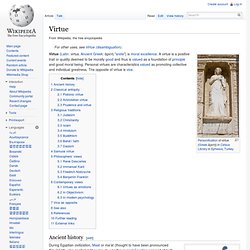
Diffident. Ebullient. Contretemps. Contrite. Extemporaneous. Histrionic. List of English words of Yiddish origin. This is a list of words that have entered the English language from the Yiddish language, many of them by way of American English.
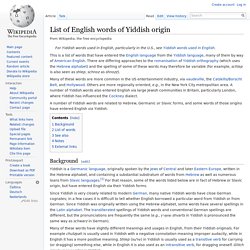
There are differing approaches to the romanisation of Yiddish orthography (which uses the Hebrew alphabet) and the spelling of some of these words may therefore be variable (for example, schlep is also seen as shlep, schnoz as shnozz). Many of these words are more common in the US entertainment industry, via vaudeville, the Catskills/Borscht Belt, and Hollywood. Australian English. History[edit] The earliest form of Australian English was spoken by the children of the colonists in early New South Wales.
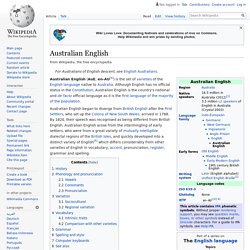
This first generation of native-born children created a new dialect that was to become the language of the nation. The Australian-born children in the new colony were exposed to a wide range of dialects from all over the British Isles, in particular from Ireland and South East England.[6] The native-born children in the colony created the new dialect from the speech they heard around them, and with it expressed peer solidarity.
Even when new settlers arrived, this new dialect was strong enough to blunt other patterns of speech. A quarter of the convicts were Irish. Some elements of Aboriginal languages have been adopted by Australian English—mainly as names for places, flora and fauna (for example dingo) and local culture. Effervescent. Gestalt. Yiddish word for angel of death. Analogy. Simile. Metaphor. Get the Word of the Day - protean. Henchman. Twonk. Circumspect. Pugnacious. Pensive. Et al. Garrulous. Reprobate. Vociferous. Vociferous. Scorn. Supercilious. Magnanimous. Adjective generous in forgiving an insult or injury; free from petty resentfulness or vindictiveness: to be magnanimous toward one's enemies. high-minded; noble: a just and magnanimous ruler.
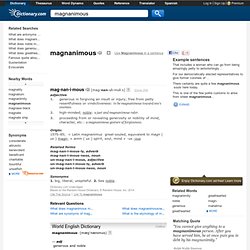
Magnanimity. Magnanimity (derived from the Latin roots magna great, and animus, mind, literally means greatly generous) is the virtue of being great of mind and heart.
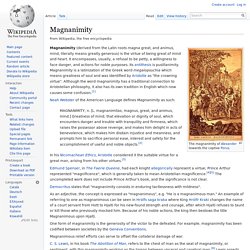
It encompasses, usually, a refusal to be petty, a willingness to face danger, and actions for noble purposes. Its antithesis is pusillanimity. Vitriol. Formidable. Itinerant. List of French expressions in English. English contains many words of French origin, such as art, competition, force, machine, money, police, publicity, role, routine, table, and many other anglicized French words.
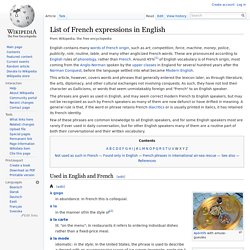
These are pronounced according to English rules of phonology, rather than French. Around 45%[1] of English vocabulary is of French origin, most coming from the Anglo-Norman spoken by the upper classes in England for several hundred years after the Norman Conquest, before the language settled into what became Modern English. This article, however, covers words and phrases that generally entered the lexicon later, as through literature, the arts, diplomacy, and other cultural exchanges not involving conquests. As such, they have not lost their character as Gallicisms, or words that seem unmistakably foreign and "French" to an English speaker. Used in English and French[edit] What is the Definition of Facetious? Schatzi. What does Schatzi mean? Vexation. Get the Word of the Day - quixotic.
Ephemeral. Svengali. Svengali as a spider in his web.
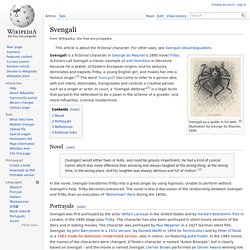
Cogent. Exquisite. Irascible. Capricious. Alacrity. Curmudgeon. Perdition. Euphemism. Insouciance. Insipid. Ötzi. Ötzi (German pronunciation: [ˈœtsi] ( ); also called Ötzi the Iceman, the Similaun Man, the Man from Hauslabjoch, Homo tyrolensis, and the Hauslabjoch mummy) is a well-preserved natural mummy of a man who lived around 3,300 BCE.[2][3] The mummy was found in September 1991 in the Ötztal Alps, hence Ötzi, near the Similaun mountain and Hauslabjoch on the border between Austria and Italy.[4] He is Europe's oldest known natural human mummy, and has offered an unprecedented view of Chalcolithic Europeans.
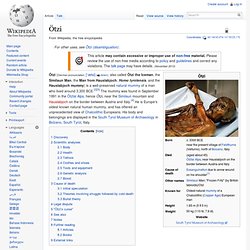
His body and belongings are displayed in the South Tyrol Museum of Archaeology in Bolzano, South Tyrol, Italy. Discovery Ötzi the Iceman while still frozen in the glacier, photographed by Helmut Simon upon the discovery of the body in September 1991 46°46′45.8″N 10°50′25.1″E / 46.779389°N 10.840306°E / 46.779389; 10.840306.[7] The province of South Tyrol therefore claimed property rights, but agreed to let Innsbruck University finish its scientific examinations. Scientific analyses Body. Tete a tete meaning. Insidious. What is the Definition of Epitome? Allegory. Allegory of Music by Filippino Lippi (between 1475 and 1500): The "Allegory of Music" is a popular theme in painting.
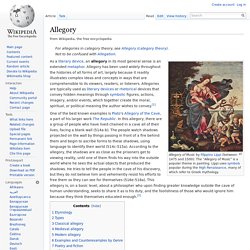
Lippi uses symbols popular during the High Renaissance, many of which refer to Greek mythology. Conclave. Ecstatic. Redoubtable. Ardour. Slough. Indolent. Imprudent. Priapic. Obstinate. Prosaic. What is the Definition of Sanguine? Loquacious. Poignant. Perspicacious. Modulate. Visceral. Iwi. In New Zealand society, iwi (Māori pronunciation: [ˈiwi]) form the largest social units in Māori culture.
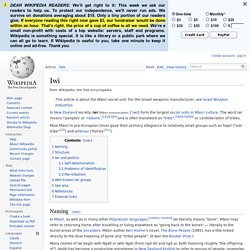
The word iwi means "'peoples' or 'nations',[1][2][3][4] and is often translated as "tribe",[5][6][7][8][9] or confederation of tribes. Most Māori in pre-European times gave their primary allegiance to relatively small groups such as hapū ("sub-tribe"[10]) and whānau ("family"[11]). Naming[edit] Pākehā. Pākehā is a Māori language term for New Zealanders who are "of European descent".[1] Recently, the word has been used to refer inclusively either to fair-skinned persons or any non-Māori New Zealander.[2][3] Papa'a has a similar meaning in Cook Islands Māori.[4] Its etymology is unclear, but the term was in use by the late 18th century. In the Māori language, plural nouns of Pākehā may include Ngā Pākehā (definite article) and He Pākehā (indefinite article). When the word was first adopted, the usual plural in English was Pakehas.
However New Zealand English speakers are increasingly removing the terminal s and treating Pākehā as a collective noun. Ignominious. The Great War (TV Series 1964– ) Wise old man. A wise old man: "Philosopher in Meditation" by Rembrandt Traits[edit] This type of character is typically represented as a kind and wise, older father-type figure who uses personal knowledge of people and the world to help tell stories and offer guidance that, in a mystical way, may impress upon his audience a sense of who they are and who they might become, thereby acting as a mentor. He may occasionally appear as an absent-minded professor, appearing absent-minded due to a predilection for contemplative pursuits. Quel dommage. C'est dommage. Verities. Edifying. Definition bluestocking. Kia ora. This article is about the greeting in Māori. For the soft drink, see Kia-Ora. For the locality in North Otago, see Kia Ora, New Zealand.
Kia ora is a Māori language greeting which has entered New Zealand English. It means literally "be well/healthy" and is translated as an informal "hi" at the Māori Language Commission website Kōrero Māori. It is also used as a farewell and thanking someone as well.[1] The New Zealand Ministry for Culture and Heritage website NZ History lists it as one of 100 Māori words every New Zealander should know, with a definition "Hi! It also signifies agreement with a speaker at a meeting, as part of a culture which prizes oratory.
Namaste. Namasté (/ˈnɑːməsteɪ/ NAH-məs-tay; Hindi: [nəməsteː] ( )), sometimes expressed as Namaskar or Namaskaram, is a customary greeting when individuals meet or depart.[1][2] It is a form of greeting commonly found among Hindus of Indian Subcontinent, in some Southeast Asian countries, and diaspora from these regions.[3][4] Namasté is spoken with a slight bow and hands pressed together, palms touching and fingers pointing upwards, thumbs close to the chest. This gesture is called Añjali Mudrā or Pranamasana.[5] In Hinduism it means "I bow to the divine in you. Affectation. Eudemonics. Rambunctious. Schatzi meaning german. Altruist. Patronizing. Condescending. Petulant. Erudite. Erudite. Mercurial. Perdition. Petulant. What is the Definition of Caveat?